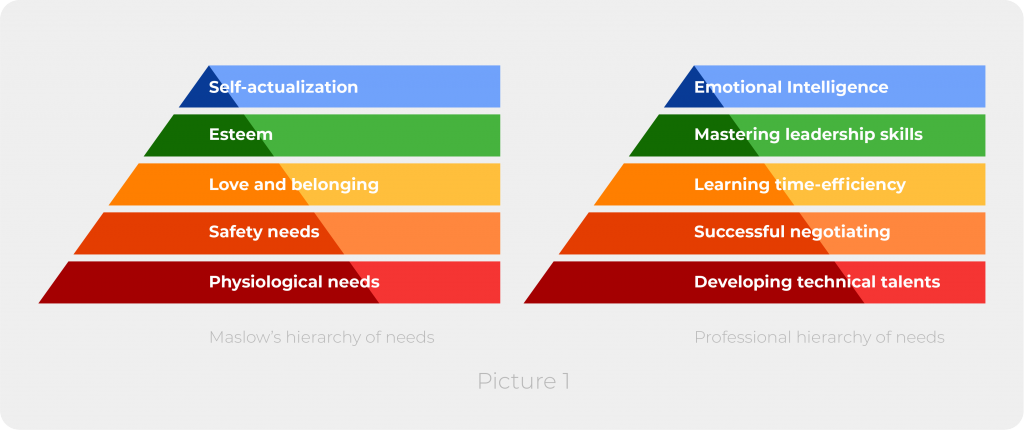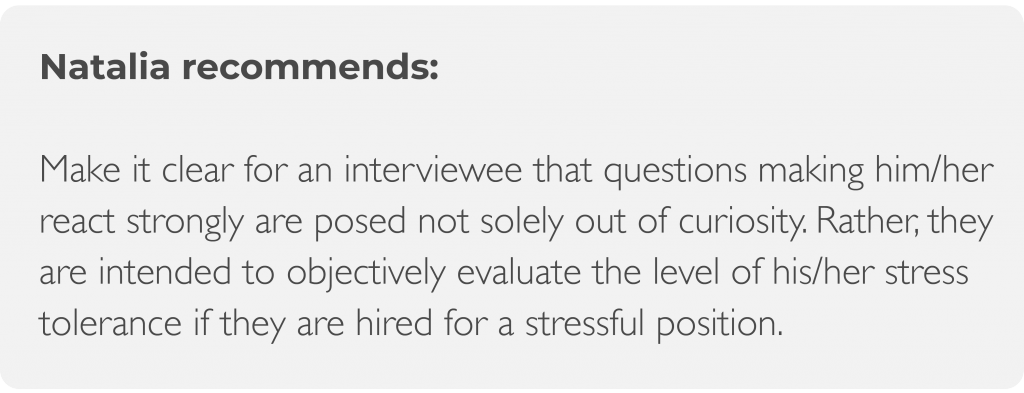Think of your recent job task. How well do you think you coped with it? Was it down to purely technical skills or an emotional impact you have on your team? Given that Emotional Intelligence is so on today, we tried to learn if it is truly beneficial or ridiculously overrated.
written by:
Veronica Chizh
Think of your recent job task. How well do you think you coped with it? Was it down to purely technical skills or an emotional impact you have on your team? Given that Emotional Intelligence is so on today, we tried to learn if it is truly beneficial or ridiculously overrated.
Climbing the ladder of professional excellence poses new challenges for everyone, as the demands of the professional market are reshaping constantly. Alena Sysoeva, a Ukrainian business coach and speaker, links this transformation to the evolution of market demands. If put graphically (picture 1), we replicate the hierarchy of needs tuned to reflect our professional necessities. Once we used to focus on mastering our technical talents, strived to be successful negotiators, and sellers. This was the basis and as we had laid it, we moved further to learning time-efficiency and creating our own life-balance wheel. Later on, time has come to find out what true leadership is. Today’s challenge in front of the leaders as well as the followers is to dominate the field of Emotional Intelligence (EI).
This area is still relatively new to us, despite that the term ‘emotional Intelligence’ was coined by John Mayer and Peter Salovey in 1990. The concept had enough time to evolve, and, according to EI-missionaries, now as it is applied in practice, allows leveraging our inter-personal powers to better tackle work-related and personal issues. To many, though, the term is somewhat pseudoscientific. Prejudice apart, we decided to dig deeper in global practice along with the practices applied by Qulix Systems for the project management and see for ourselves the value of the performance based on Emotional Intelligence.
Recent studies in the field
Over the past decade, several benchmarking studies showed that roughly 30 percent of ‘occupational performance is based on EI’, with leadership pointing even to higher figures – 67 percent of leadership is dependent on Emotional Intelligence.
AMADORI, a McDonald’s supplier in Europe, conducted a three-year survey to assess links between emotional intelligence, individual performance, organizational engagement, and organizational performance. The survey demonstrated massive correlation between increased organizational engagement and EI (76%). Plants with higher organizational engagement were outperforming their peers in productivity, while employee turnover slowed down by 63 percent during the survey.
According to Paul Stillman’s recent study, 73 percent of company’s managers improved their efficiency through techniques of Emotional Intelligence.
Project Management: Leader vs Executive
Two of the above mentioned highlights point to the crucial role of EI for the managerial staff. Natalia Burets, Head of HR Department at Qulix Systems and a qualified psychologist, comments on it: “As far as project management is concerned, managerial skills and Emotional Intelligenceare somehow clustered. Along with that, a question arises, which came first: the chicken or the egg? Is it EI that helps a person become a leader, or is it managerial position that makes a person develop EI? Nevertheless, it is unquestionable that a leader must read and regulate other people’s emotions, as he/she orchestrates the people and needs them to follow. A manager who develops EI is likely to become such a leader, while a manager who is unwilling to develop these skills will stay a simple executive.”
Tempting as it may be for the coaches to proclaim an undeniable benefit of EI, this is not always the case, though. An inspiring and thought-provoking article by Adam Grant, The Dark Side of Emotional Intelligence, urges the reader to consider various perspectives of the EI application. Moreover, the study by Dana Joseph and Daniel Newman indicates adverse effect of EI-applying ‘in jobs that involved fewer emotional demands’, such as scientists, accountants, or mechanics.
“Do we need a manager who seeks to become an inspiring leader for brain-racking and risky endeavors, or a manager-executive to allocate the tasks and ensure these to be fulfilled? The tasks that these two particular managers fit for do not vary in priority, they are different per se,” - Natalia says.
In other words, assessing job performance shouldn’t be solely based on EI. Take the specifics of the job to get a non-biased assessment.
An EI-empowered manager: motivator or manipulator?
Speaking of Emotional Intelligence brings up another tricky issue for discussion. A true intrinsic motive can be the key performance driver of an employee. At the same time, a leader able to motivate and ignite people will most likely ensure high performance of the team. In this context, we face a challenge: what if the actual tool that the leader uses is manipulation rather than motivation? Drawing a line between the two is not easy. Justin Bariso discloses the issue of EI misuse in his article along with providing the list of techniques a manipulative leader tends to adopt in his/her behavior.
Mrs. Burets comments. “Motivation by default is not all altruistic and self-denying. It has a grain of manipulation in it. The question is: whether what you expect as a manager from an employee conflicts his/her personal interests?” Motivating an employee for a Project Manager is essential, as overcoming a challenge for an employee implies professional growth. A well-performed task brings undoubtedly beneficial results for a company and for the manager in charge. The dualistic nature of motivation is acceptable as long as the employee’s talents are developed rather than exploited.
However, if the success wasn’t down to the inner employee’s stimulus, a deliberate misuse of charisma by the leader undermines engagement. “Being manipulated provokes various ramifications, subject to psychological state of an employee” - Natalia specifies. “A psychologically strong individual will soon leave a manipulative manager. For a weaker individual, it will require more time to make a decision, but definitely such a moment will come. In a third scenario, we deal with employees who are masochist by nature. Manipulative form of psychological abuse is acceptable to them, along with constant complaining behind the manager’s back about how rude and manipulative he/she is.”
Recruiting a Project Manager: EI-based strategy
Hiring a project manager is a challenging and demanding task for a recruiter. As we’re clear with the type of a manager we look for (i.e. a leader or an executive), we build a respective strategy. For a leader, EI-based questionary with provocative and stress-inducing questions may be an option. This is exactly what Karla Cook depicts in her EI-assessing strategy for an interviewer. Failure and conflict related subjects are expected to manifest true unfalsified reactions and show how a to-be leader will react in challenging situations.
Can you tell me about a time you tried to do something and failed?
Can you tell me about a conflict at work that made you feel frustrated?
Can you tell me about a time you needed to ask for help on a project?
The above questions, in the author’s opinion, are designed to induce the feeling of shame or anger in a candidate, or will rather unveil a strong, self-reliant and reasonably critical personality. There is a possibility, though, that a well-trained candidate is ready with the socially acceptable answers to any possible question. “Emotions are no longer relevant if we ask a candidate about the stressful events that took place relatively long ago,” - Natalia contradicts. “That is why we prefer watching instead. During an interview, the candidate faces an HR and a technical expert(-s). For an HR, it is the blessed time when a technical expert talks to the candidate. They intentionally doubt a candidate’s opinion or proposals, so we can clearly see how a candidate reacts if he/she is being criticized. When interviewing a candidate for a managerial position, we may question the truths related to his/her competence. A to-be manager’s reaction can hardly be improvised.”
At the same time, Natalia highlights the importance of the atmosphere in the interview room. While putting a candidate under stress will demonstrate self-control and motivation, “being under stress often makes a person act awkward. A relaxed person behaves in a different way, and it is how he/she normally interacts with colleagues and family. To get to know a person better, we try to place him/her in best comfort”.
Insights from our Project Managers
Overprized as it may be for occupational performance, leadership is clearly EI-dependent. We asked our Project Managers how they live through the situations that make them and their teams react strongly and what helps them build favorable emotional climate during the project.
"Stress-inducing projects are a regular thing for business. At times, we have to deal with the projects that imply deeper studying of the subject on the spot. As a manager, I do my best to mitigate stress in the workplace: no overtime or working during days-off. My objective is to effectively utilize all the time five days per week that my team provides me.
If I had a choice: take a stressful project or keep my team working effectively in a less rewarding project, I’d choose the latter."
Pavel Mazko, Project Manager,
Research, Innovations and Development Department
"Emotional state of a team is paramount. Herewith, the task of a manager is to eliminate the risk of emotional draining of his/her people. The work rate should be evened out throughout the project. When sabotaging takes place, say, if a team member deliberately underperforms, thus creating additional workload for the colleagues, a stricter control from the PM is demanded.
* * *
It’s not what you say that matters, it’s what others hear. If you’re unclear about the client’s requirements, you put your team at risk. Even where a slightest possibility exists that you got the client wrong, double check the info to mitigate the risks for your team. You, as a manager, assume the whole responsibility for the task."
Alexey Krutikov, Project Manager,
Java Solutions Department
Care about the impact your leadership has and people will care about your business.
For more on our project management techniques contact us at request@qulix.com or visit our website.

Contacts
Feel free to get in touch with us! Use this contact form for an ASAP response.
Call us at +44 151 528 8015
E-mail us at request@qulix.com










